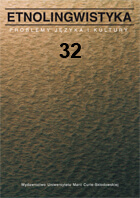Folklorystyczny aspekt współczesnych narracji potocznych
The folkloristic aspect of contemporary colloquial narratives
Author(s): Janina Hajduk-NijakowskaSubject(s): Customs / Folklore, Media studies, Pragmatics, Sociolinguistics
Published by: Wydawnictwo Naukowe Uniwersytetu Marii Curie-Sklodowskiej
Keywords: folklore; orality; cultural context; folklore-generating situation; media;
Summary/Abstract: Folklore studies as a discipline has become interested in modern colloquial narratives because it has redefined its own focus. If folklore is subject to the same transformations as the whole of culture, and is a socially and historically differentiated phenomenon, then higher precision is needed in defining its fundamental notions, such as orality, cultural context, the folklore-generating situation, the reception of the content being passed on from one generation to the next. Orality indeed cannot be narrowed down to the spoken (direct) mode of transmitting the relevant content, since it is also a way of human existence, a way of cognizing and understanding the world. It has thus become necessary to analyze in detail the changes that occur in the socio-cultural space, primarily the functioning of the media. The media do not only cause the appearance of colloquial relations, but also determine the character of contemporary folklore-generating situations, which often – in a natural way – inspire everyday narrative activity. Popular media texts, convergent with the needs and interests of receivers, enter broad circulation, popularizing general knowledge and consolidating the system of values. Moreover, a vital culture-generating role is played by the Internet in determining a new paradigm of folklore. Therefore, contemporary folklore studies has already found its place within the research domain of media anthropology: it shows how information is received and how people engage in self-creation and self-understanding of the content they deal with. This also proves that the traditional forms of creativity can successfully thrive within the new range of possibilities.
Journal: Etnolingwistyka. Problemy Języka I Kultury
- Issue Year: 32/2020
- Issue No: 32
- Page Range: 129-141
- Page Count: 13
- Language: Polish

